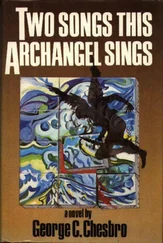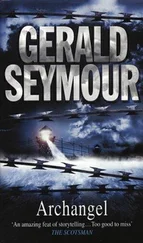Was this how adults thought? Maybe this, maybe that, and then and then and then.
“They’re just interesting ,” Miss Atkins interrupted. “My friend Daphne asked if I knew anything about them — people writing and arguing about evolution and Darwinism always point to these fish. So when one of Taggart’s friends started studying them in Kentucky, we jumped at his offer to send us some. We turned them loose in the pond and figured we’d see what happened. If they’re exposed to light, will their offspring develop eyes? If they breed with some other fish, will the offspring be blind, or not? Every now and then we drop in some traps, or run a net through part of the pond, to see what we find. So if you do see one …”
Constantine nodded and promised to let her know, suddenly overwhelmed by the sun beating down on his head, and his fierce concentration with the bud grafts and the beeswax, and this rush of words and ideas. Why not just keep the fish in a cage, or in a little pool by themselves, where they could be looked at and handled whenever you wanted? He backed away from the muddy pond, longing for the cool clear lake down below and the crowd of boys who swam there after chores and who, deep in their own pleasure, had let him splash among them yesterday without asking any questions. “Pete,” one had said, and then others offered their names, Luke and Corey and Frank and the rest; all he’d had to offer was his own (Stan hadn’t seemed so stupid then) and the phrase, “I’m visiting,” and someone had held out a hand to pull him up onto the dock.

HE SWAM THERE whenever he could get away; every day the heat grew worse and Taggart, who said they’d never had a June like this, asked Beryl to do all her cooking in the morning. That helped some, but beets had to be thinned regardless of the weather, the apple trees needed spraying with Bordeaux mixture, and they ended up doing heavy chores first thing in the morning and then again after dusk. When the sun was at its worst they retreated to the porch, where Ed wrote articles and Taggart did paperwork, leaving Constantine to doze and consider all he’d already learned, and to imagine exploring whatever else lay within walking distance of the farm.
Before he could go anywhere, though, the cows had to be milked, the milk weighed and the data charted, his duties pulsing steadily through each day. Less steadily, but still several times a week, Miss Atkins came by to see a new flower or some freshly hatched chicks, or to show them a bat or a fossil she’d found in the Glen. Always she ended her visits by shedding her shoes and stockings, slipping on pants, and checking the trap she left in the pond for the blind white fish. Constantine, wanting to help, swept the water regularly with a dip net in her absence, but he brought up only the same minnows, catfish, frogs, and snails that made their way into the traps: never the Amblyopsis . Equally elusive were answers to his simplest questions about this place and its people. What, for instance, kept the farm afloat financially?
He could see money coming in from Ed, who in addition to his duties at the farm worked as the agricultural reporter for a Syracuse newspaper and paid Taggart room and board — but then it went out again to Beryl, paid to keep house. He himself worked for free, but he ate enormously and Taggart provided all his food, along with his work clothes, barn boots, and clean linen. Milk and eggs and vegetables were their own, but Taggart had to buy beef and grain and other supplies. The experiments they did in the orchard weren’t aimed at increasing their yield of apples or pears but at developing new breeds; the same was true in the vegetable garden; they sold much of their milk to a local cheese maker but the point of all the weighing and measuring didn’t seem to make the herd more productive.
One afternoon, when Ed and Taggart were busy with something in the village, Beryl emerged from the kitchen with a basket of laundry and caught him staring over the terraced vineyards below as he pondered these mysteries. “Are you homesick?” she asked.
“I’m not a child ,” he said, startled to have her ask something personal. Although she was there when he came in for breakfast and stayed until the supper dishes were done, they talked only about the tasks that needed doing each day. “I’ve worked away from home the last three summers.”
“Your uncle mentioned that,” she said. “And also said that your father …” She stopped, smoothed a creased shirt, began again. “Was it Taggart’s older brother you visited?”
“Harry,” he said, pausing to consider all the hours she and the men spent without him. “Do you know him?”
She shrugged. “Not really; I was a baby when he left, and not much older when your mother ran off with your father. I was wondering if he was like Taggart. Or if your mother was, for that matter.” She prodded the heap of damp clothes with one foot. “You don’t talk much about the rest of your life.”
“Neither do you,” he said, more sharply than he meant.
She carried the basket to the clothesline and pinned a shirt that might have been his. Ran off— what did she know?His mother said she’d met his father, a stranger to the area, at the county fair and gone happily with him to Detroit when he found work. It was back there that he felt, not homesick but … some other thing. Wedged into a small flat with his three sisters and his parents, he longed for Uncle Harry’s farm — as, he imagined, he would long for this place someday. Clean sheets on a bed his own, a room with no one else in it. Good food, time to himself, and a property that, although modest in size, continued to surprise him.
The dips and rises broke it into small fields and pastures; the trees pressed close and so did the neighboring vineyards; in sheds and outbuildings, benches bore tubs of peculiar substances. Balsam, he guessed of one, sniffing closely; lint, cottonseed, some kind of oil. Yesterday he’d discovered a room packed with wood, metal rods, glinting shavings, wires, lathes, chisels. Elsewhere chicks warmed beneath lamps, beans fermented, seeds slept in paper bags. Some days Taggart and Ed disappeared into one or another building after breakfast and didn’t emerge until it was time for the evening milking; other days they sat on the porch for hours, arguing and drawing plans. Everything about the way they lived was new to him, including the neighbors who, on bicycles made by a local mechanic at the edge of the village, zipped past him as he walked down to the lake to swim. At home, his family was so far from being able to afford a bicycle that he’d never let himself want one. Here — maybe someone had an old one, a very old one, that he could have in exchange for work?
The mechanic, he soon learned, also built motorcycles: staggeringly fast, endlessly fascinating. Once, as he walked past the pharmacist’s store, he was nearly run down by a thin man with a dark mustache, crouched low over the handlebars of a model with a particularly raucous engine. Other days, as he watched motorcycles dart past loaded wagons, annoying even the drivers of the automobiles already annoying the horses, he imagined himself as one of the goggled drivers. On the afternoon that Ed and Taggart tore out of the driveway on a pair of motorcycles he hadn’t seen before, only his mother’s orders not to ask for anything kept him from begging for a ride.
He did the milking and the data tabulation by himself that evening, finishing up before he heard the pair of engines tracing their way along the west shore road, through the village, up the hill to the house. Both men were talking happily as they made their way toward the barn and then, once they saw all the work was done, into the house.
Читать дальше













